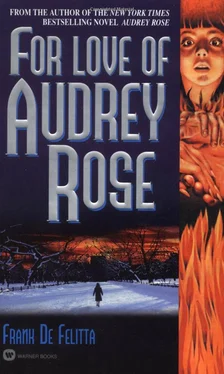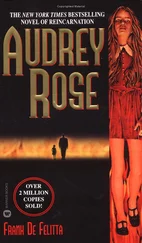“February 3, 1975.”
“Oh, yes. There was an inquiry. A man… let’s see… Name of William Templeton. He left about an hour ago.”
Janice gasped. “Did you — did you show him the birth registrations on that date?”
“Yes, of course. We’re legally obligated—”
Janice slammed the receiver down, fighting tears. Urgently, she turned back into a world of swirling white.
Through the downcoming particles, she saw the gleaming windows of a city bus, like a whale from some macabre cartoon, its huge headlights on, unblinking like morbid eyes, staring into the twilight. She ran to the open door, mounted the steps.
“How far north do you go?” she asked the driver.
“Top of the park, then east.”
Janice paid, then sat down. She could feel the wheels of the bus squirming for traction underneath, grinding, groaning against the road. At every stop, she held her breath, not knowing whether the enormous mass of the bus could be held by the brakes. The windshield wipers, working furiously, clotted with wet snow.
“This is the worst goddamn snowfall I ever seen,” the driver said, wiping off his window with a white cloth.
“They say there’s another foot on the way,” a passenger chimed in.
“I tell you one thing. This city is shutting down. Ain’t nobody gonna drive out in weather like this.”
Ahead of them, another taxi, trying to make the light, applied its brakes without result. The wheels curved, but the taxi kept on in a straight line, digging huge tracks right through the intersection.
“Lucky bastard,” commented the driver.
This time the bus refused to move. The rear wheels ground out a plainsong of high-pitched protest, until it sounded like a scream. Janice held her hands over her ears.
“That’s it,” the driver said. “Everybody out.”
“But I—” Janice began.
“You want to sleep here? I’ve got instructions not to drive when there’s no traction!”
Dismally, the passengers filed out, looking in vain down the deserted streets. Janice crossed the avenue, found herself at the north edge of Central Park, went quickly across to Park Avenue, cut over, and waded through the snow under bare trees hanging down with the weight of long spears of ice.
As she crossed into 110th Street, she saw clusters of blue-coated patrolmen slogging through snowdrifts, heading north, where two long shafts of light cut across the clouds.
At 115th Street, she saw two police cars edging cautiously behind a snow-sweeping machine. The orange lights bounced luridly off the dark buildings, gleamed from the windows. A few boys threw snowballs at her, taunting her.
She followed the police cars, the only secure footing on the road, until she reached 118th Street. To her horror, she knew by now where the cars were going. Dim shouts rose in the distance, a sound of far-away bullhorns, and taxi horns from congested lanes of traffic.
A fire truck blocked access to the main blocks of public housing.
“I have to go through!” Janice protested.
“Do you live here?”
“No, but—”
“Then beat it!”
The traffic cop turned away, angrily motioning a pickup truck out of the lane, backward, to where the snow was churned up by countless vehicles turning around in the grimy mud.
Janice ducked under the cross guard and ran toward the dense group of officers in front of the probing spotlights. Their silhouettes had matted together into a single obstruction; only their helmets, denoting different ranks, gleamed in the awesome blue white light.
Janice turned. From the top window, where the spotlights crossed, she heard a woman screaming. The words were run together, a litany of Spanish and English, waving her arms. Behind her, shivering on a landing, a group of neighbors stood, looking upward at the roof. But Janice could see nothing there, only the rolling clouds cut by the spotlights, and the falling snow.
“Please,” she whispered to an officer who held steaming coffee in a tin mug, “I have to talk to the officer in charge.”
“The officer in charge?” he said, smiling. “I don’t think so. The chief is busy right now trying to keep that guy on the roof.”
“But you don’t understand, I’m his—”
“Now I suggest you get back behind the barrier with the rest of the gawkers.”
Drinking coffee with one hand, guiding her with the other, he steered her back to the fire truck, the turning yellow light gleaming rhythmically off his cup.
Janice struggled free from his grasp.
“Ask the woman up there!” she yelled. “Mrs. Hernandez! Ask her who I am!”
The officer glared at her angrily, yet uncertain now.
“Exactly who are you, ma’am?” he said wearily.
“I’m Mrs. Janice Templeton. And the woman knows me!”
“Now you get back across that barrier before I lose my temper.”
“I’m Mrs. Janice Templeton!” she wept. “And that man up there is my husband!”
Janice buried her face in her hands. The officer paused, nonplussed and suspicious.
“I’ll let you tell your story to the chief,” he said tautly, “but if you’re playing games, you’re going to feel very bad in the morning.”
She mumbled her thanks, and felt him holding her up as her feet slipped sideways on the ice. As they passed the patrol cars, she heard bursts of static and STILL UNIDENTIFIED … THE GIRL SEEMS ALL RIGHT … WRAPPED IN BLANKET … REPEAT, THE GIRL STILL ALIVE AND IN GOOD HEALTH… Soon she was among the blue patrol cars and clusters of uniformed men, many of whom held long guns in their gloved hands, waiting for orders, sipping hot drinks.
When a patrolman offered her a plastic cup, she tried to drink. But her shaking hands spattered steaming liquid into the snow.
Now Janice saw a news team aiming its video cameras upward, at the roof of 385 118th Street. Directional microphones were pointed at the top window, trying to catch Mrs. Hernandez’s incoherent screams.
“My God! He’s got my baby! Oh, my God! He’s going to kill her!”
Evidently, the police had given up trying to calm her down, since they only watched over her head, past the iron guardrail and a rusted fire escape platform. Janice peered
into the darkness but saw nothing, only the low cloud covers. The snow had stopped falling. A bitter, calm cold froze everything and everybody. Mrs. Hernandez fainted at the window, her last shriek grown dismal and strained. Janice saw her sister gently pull her back into the apartment.
A tall man in a yellow slicker walked up quickly behind the officer.
“The chief’s got other things to do,” he said. “My name is Wilkins. I’m in charge. Now, who are you?”
“I’m Janice Templeton,” she said, intimidated. “And my husband is the man up there.”
“You sure?”
“I know it’s Bill.”
“How do you know it’s Bill?”
“Because I know what he’s looking for.”
The officer and Wilkins exchanged glances. Puzzled, angry, suspicious, they were also frustrated by the cold, the hostile crowd that had gathered around, throwing ice balls, and now this woman who had come forward acting important.
“What is he looking for?” the officer asked as patiently as he could, rubbing his gloved hands for warmth.
Janice accepted another cup of hot coffee, this time able to keep from spilling.
“He’s looking for a girl he believes to be his daughter,” she said.
“What’s he, drunk?” Wilkins shouted. “A psycho?”
“He’s been in a sanitarium. He escaped yesterday.”
The officer leaned forward again, remaining polite.
“What sanitarium is that, ma’am?” he asked.
“The Eilenberg Clinic. In Ossining.”
“And what is the doctor’s name?”
Читать дальше












